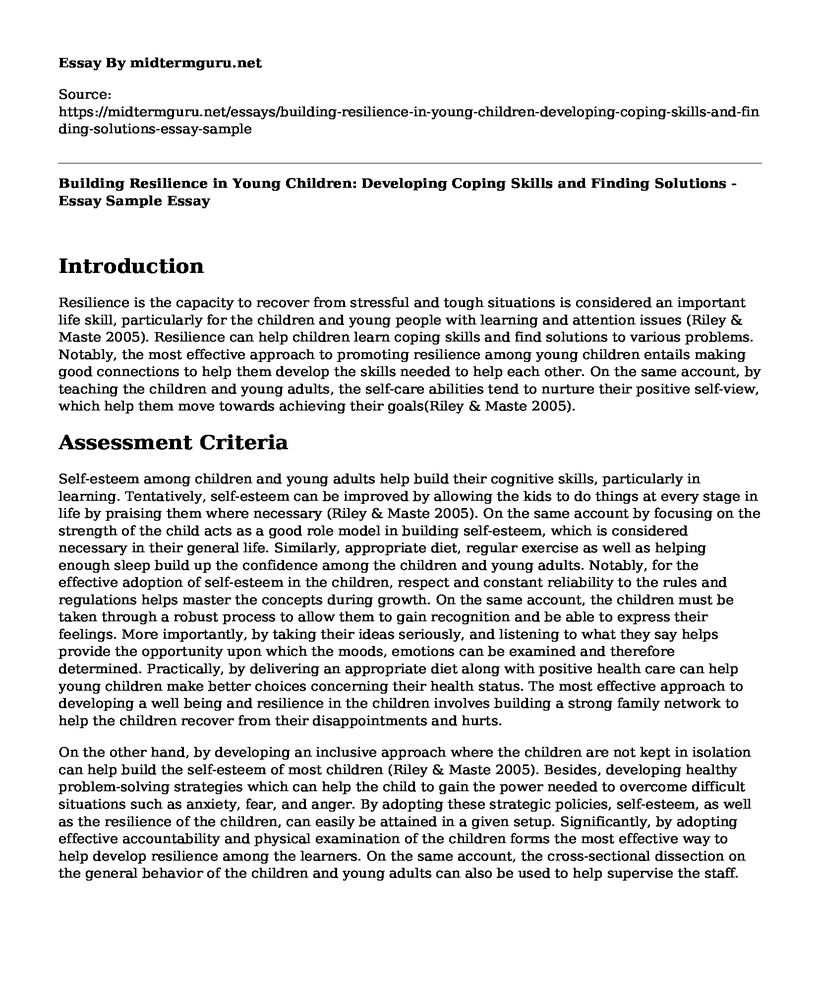Introduction
Resilience is the capacity to recover from stressful and tough situations is considered an important life skill, particularly for the children and young people with learning and attention issues (Riley & Maste 2005). Resilience can help children learn coping skills and find solutions to various problems. Notably, the most effective approach to promoting resilience among young children entails making good connections to help them develop the skills needed to help each other. On the same account, by teaching the children and young adults, the self-care abilities tend to nurture their positive self-view, which help them move towards achieving their goals(Riley & Maste 2005).
Assessment Criteria
Self-esteem among children and young adults help build their cognitive skills, particularly in learning. Tentatively, self-esteem can be improved by allowing the kids to do things at every stage in life by praising them where necessary (Riley & Maste 2005). On the same account by focusing on the strength of the child acts as a good role model in building self-esteem, which is considered necessary in their general life. Similarly, appropriate diet, regular exercise as well as helping enough sleep build up the confidence among the children and young adults. Notably, for the effective adoption of self-esteem in the children, respect and constant reliability to the rules and regulations helps master the concepts during growth. On the same account, the children must be taken through a robust process to allow them to gain recognition and be able to express their feelings. More importantly, by taking their ideas seriously, and listening to what they say helps provide the opportunity upon which the moods, emotions can be examined and therefore determined. Practically, by delivering an appropriate diet along with positive health care can help young children make better choices concerning their health status. The most effective approach to developing a well being and resilience in the children involves building a strong family network to help the children recover from their disappointments and hurts.
On the other hand, by developing an inclusive approach where the children are not kept in isolation can help build the self-esteem of most children (Riley & Maste 2005). Besides, developing healthy problem-solving strategies which can help the child to gain the power needed to overcome difficult situations such as anxiety, fear, and anger. By adopting these strategic policies, self-esteem, as well as the resilience of the children, can easily be attained in a given setup. Significantly, by adopting effective accountability and physical examination of the children forms the most effective way to help develop resilience among the learners. On the same account, the cross-sectional dissection on the general behavior of the children and young adults can also be used to help supervise the staff.
Assessment Criteria
In this case, since the academic resilience scale is the recently developed measure, particularly in the context of academics. Notably, upon examining the children on the tendency to preserve and succeed in education despite various adversities, it focuses on both the cognitive and behavioral response. The items considered on this scale involves
- Perseverance
- Reflecting and Adaptive Help-Seeking
- Negative Affect and Emotional Response
High scores on factors 1 and 2 and low scores on factor 3 indicate high resilience among the children. Besides, this scale is highly internally reliable as the effective way of conducting the evaluation. Life challenges such as feeling sad, feeling cared for, angry, tension are the prominent challenges to resilience. On the same account, the misfortunes significantly affect the health of young people with regards to resistance. By adopting the relevant strategies on promoting resilience among young adults, the assessors can easily measure and evaluate the level of resilience acquired by the learners.
References
Riley, J. R., & Masten, A. S. (2005). Resilience in context. In Resilience in children, families, and communities (pp. 13-25). Springer, Boston, MA.
Cite this page
Building Resilience in Young Children: Developing Coping Skills and Finding Solutions - Essay Sample. (2023, Feb 07). Retrieved from https://midtermguru.com/essays/building-resilience-in-young-children-developing-coping-skills-and-finding-solutions-essay-sample
If you are the original author of this essay and no longer wish to have it published on the midtermguru.com website, please click below to request its removal:
- Special Teaching in Higher Education - Paper Example
- Theravada Religious Teachings Promotion of Prostitution - Essay Example
- The LGBT Community Discrimination - Essay Sample
- UAE: A Sovereign Federation of Seven Emirates - Research Paper
- Gender Disparity in US Senate: Success in Political Campaigns - Research Paper
- Paper Example on Culture-Bound Syndromes: Bipolar Disorder
- Depression: A Combination of Psychological, Social and Biological Factors - Essay Sample







